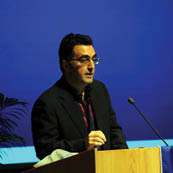
Documentary filmmaker and former Newsweek correspondent Maziar Bahari spoke on the status of Iran—its people and its government—to a crowd of NSU students, faculty, staff, and guests on Oct. 18. He also discussed his own imprisonment in 2009, during which he was held in Tehran for more than 100 days as an accused spy. Hosted by the Farquhar College of Arts and Sciences Division of Humanities, the talk was part of the college’s Distinguished Speakers Series.
Bahari began by screening a clip from The Daily Show with Jon Stewart, titled Behind the Veil: Minarets of Menace. The satirical segment finds show correspondent Jason Jones on a quest to discover “why Iran is so evil.” As part of his search, Jones visits a coffee shop to interview Bahari, portrayed in the video as a clandestine source codenamed Pistachio. Bahari tells Jones there are many misconceptions about Iran and that “Iranians and Americans have much more in common” than most people may think.
After enjoying a few laughs, audience members learned that the Daily Show segment actually played a key role in Bahari’s detainment. Bahari’s captors interrogated him about the clip, mistaking the video for a real covert meeting between him and Jones.
“‘I thought, ‘They can’t be that stupid,’” Bahari said about his captors, who determined, “The reason you want to find similarities is because you want to find a way for [Americans] to infiltrate our country.”
Bahari said he tried to win over the emotions of the “weak men” throughout his interrogation, but the captors failed to see the humor in the video, and still considered him a spy. As a result, Bahari was held for 118 days at the notorious Evin Prison, until released on $300,000 bail after increased international pressure.
Bahari’s talk then shifted to the current state of Iran, during which he emphasized popular misconceptions about Iranian citizens. “The Iranian people are the most pro-American people I know in the Middle East,” he told the audience.
According to Bahari, it’s the Iranian government that has a stronghold on its people. However, that strength is weakening because of increased education (65 percent of Iranian university students are female), there are more women in government, and clerics are becoming more politicized against the regime.
Additionally, Bahari said the advent of the “digitalized revolution” and increased access to the Internet and television for Iranian citizens has helped them become more aware of their rights, and has also widened the gap between the government and the people.
Following his formal remarks, Bahari led a Q&A session with audience members, furthering the discussion about Iran.
When asked what Americans can do to help the Iranian people, Bahari suggested that they “try to have a conversation” through social media and other digital means. He also encouraged citizens to question the American government’s current policies, because he believes “the sanctions are helping the Iranian government.”
The talk concluded with a book signing and a meet and greet. Prior to the evening’s events, Bahari met with students from the Farquhar College of Arts and Sciences in a special seminar.
Coming Up
The Farquhar College of Arts and Sciences welcomes theoretical physicist Brian Greene, Ph.D., to campus on Nov. 14, as part of the Distinguished Speakers Series. The bestselling author is known for his entertaining explanations of cutting-edge scientific concepts. Greene will present a talk titled “Explaining the Elegant Universe.”
Tickets are required for admission and will be available beginning Monday, Oct. 29. Pick up tickets from the college’s Office of the Dean, located in the Mailman-Hollywood Building, second floor. Limit two per person with a valid NSU ID. For more information, call (954) 262-8236.

